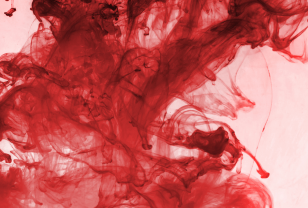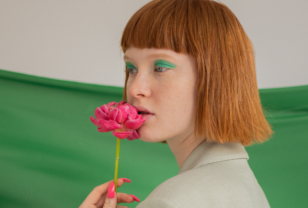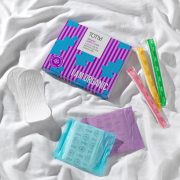Noticed changes to your menstrual cycle during lockdown? We caught up with Medical Herbalist and founder of Forage Botanicals, Natasha Richardson to find out how these changes to your lifestyle could impact your period.
“A lot of things have changed this last month. For many of us, our lives are hardly recognisable. This shift can cause us a lot of stress and result in another unexpected change: a surprise period. By surprise, I mean one that came sooner or later than you’d expected. You may have had this happen in the past after a stressful time in your life. You might have even missed a period altogether. These two things happen for different reasons, but it all comes down to stress in the end.
How stress can impact your menstrual cycle
Normally a menstrual cycle is somewhere around 28 days in length. That’s 28 days from the first day of your period to the first day of the next one. There is (in a healthy cycle) roughly 14 days between your period beginning and ovulation, and from ovulation to your next period. Usually after you ovulate, your body produces progesterone to maintain the endometrial wall and nourish it in case a fertilised embryo comes along. If one doesn’t, then progesterone drops off after about 14 days and the endometrial lining sloughs off in the form of a period.
The trouble is, when we are stressed, we don’t make as much progesterone. This happens because the body can either make the stress hormone cortisol or progesterone – it can’t make both. Or rather, when we make cortisol, we are inevitably making less progesterone. Cortisol is one of those famous flight or fight hormones we need during stress. It competes with progesterone in this way because it’s protecting us from getting pregnant during times of high stress.
But why might we miss a period altogether if stress shortens the cycle?
Well, depending when the stress occurs in the cycle it can also stop you from ovulating altogether! This would mean that you don’t have a period for more like 2 months because your body waited for the stress to go away before you ovulate! Clever eh?
So, what can we do if stress is shortening or lengthening the cycle?
Well, if you can’t partake in the relaxing self-care rituals like long baths, reading with a cup of tea or massage then I’d recommend turning to herbs*!
Relaxants such as chamomile (Chamomilla recutita) are readily available in the super market in tea bags and will help with that visceral panicky feeling. It reduces the feeling of stress and anxiety whilst you’re experiencing it.
Adaptogens are a group of herbs which help us adapt to stress. This means they reduce our cortisol levels and redress that hormone balance. I’d recommend liquorice (Glycyrrhiza glabra) if you don’t have high blood pressure and ashwagandha (Withania somnifera) if you do.
Nerve tonics such as oat tops (Avena sativa) and hawthorn (Crataegus spp.) help coat our nerves in metaphorical bubble wrap, protecting us from the stressors in our environment at present.
How to take them:
You can take these herbs as teas or tinctures.
Teas:
Firstly, take a herb from each of the categories (aka one relaxant, one adaptogen etc.) and combine them in equal quantities e.g. 10g of each.
Secondly, take a heaped teaspoon of this combination and pour on boiling water. Let it infuse for 5mins before straining. Drink 3 cups of this a day.
Tinctures:
A tincture is an alcohol extract of a herb. To take it you simply combine 10ml of each herb then take 5ml of this mix 3 times a day.
You’ll find ashwagandha, oat and hawthorn in our Rested Resilience latte. This is a herbal powder with chai spices, which can be drunk with hot oat/nut milk as you would a latte.
I hope that gives you plenty ideas to be getting on with!
To hear more from Natasha, you can follow Forage Botanicals on Instagram, Facebook or Twitter. Or you can read her book, Your Period Handbook, available to pre-order here.
Self-care is so important at the moment. We’re running our self-care series on Instragram to help you take some time for yourself, lift your mood and relax. Discover the series here.
*This blog has been designed to be informative and educational. Remember, everyone’s health needs and restrictions are unique to the individual. You are ultimately responsible for all decisions pertaining to your health. These tips are not intended to be a substitute for professional medical advice, diagnosis, or treatment. Always seek the advice of your physician or other qualified health provider with any questions you may have regarding a medical condition. If you have any concerns or questions about your health, you should always consult with a physician or other health-care professionals.





